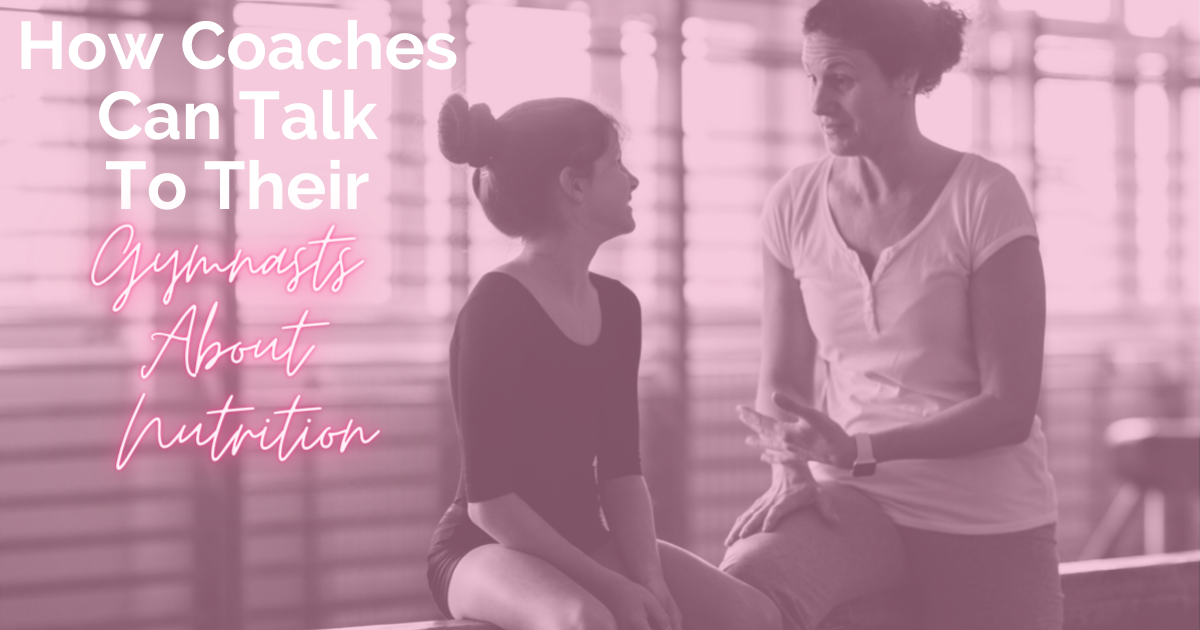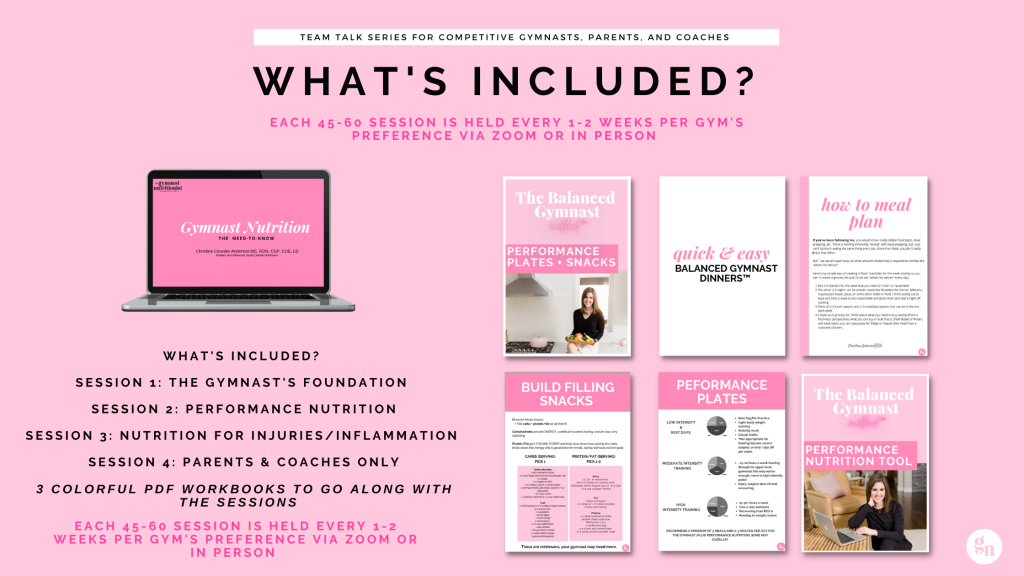explore the blog
free training
The Podcast
Learn to fuel the gymnast for optimal performance and longevity in the sport.
How to Fuel the Gymnast
Learn how to fuel your gymnast so that you can avoid the top 3 major nutrition mistakes that keep most gymnasts stuck, struggling, and injured.
looking for...?
A lot of coaches think they are qualified to give nutrition advice to the gymnast because they themselves were a gymnast that was successful. This unfortunately not an appropriate qualification and can lead to great harm.
It’s common for coaches to line gymnasts up at the start of practice and ask them questions, tell them the assignments for the day, encourage them, etc. One of the more common practices is asking gymnasts what they had to eat for breakfast or the meal before practice, and then provide critique to them.
It makes so much sense that coaches want to do everything they can to help their gymnasts reach their goals and dreams. And, coaches know that nutrition, strength and conditioning, and sports psychology all play an important role beyond training.
There is a really great article by an elite sports psychologist that highlights WHY it’s so difficult as a coach to discuss nutrition and body weight with athletes, but especially female athletes. Sean McCann, PhD says “Many coaches who have tried to push the performance envelope by focusing on nutrition, body fat, and weight of their athletes find that they have wandered, unintentionally, into an emotional minefield. What may have begun as a search for a performance edge can evolve into something altogether different. The reality is this: for most athletes, discussions of weight gain, weight loss, decreasing body fat, the performance impact of leanness, percentages of carbohydrates in a diet, and other sports nutrition topics are subjects that come at times with a great deal of emotional baggage. This is especially true for female athletes.
He has a list of 10 do’s and don’ts when talking about nutrition for female athletes and I’ve edited them below to be appropriate for the high level gymnast.
The 10 Do’s and Don’ts when Talking about Nutrition for the Gymnast
1.Don’t talk about weight loss, body fat, or diets. If the gymnasts ask, keep it focused on performance.
2. Don’t give nutrition advice nor ask gymnasts about what they ate (in private or in front of teammates). This is not the coaches job or scope of practice and if you are concerned, please speak to the parent.
3. Don’t assume that you can talk to a gymnast about food or her weight without things “getting emotional”.
4. Don’t treat weight as a matter of personal character (“If you had some discipline, weight wouldn’t be an issue!”)
5. Don’t verbally jump on athletes every time you see them eating poorly. (“You’ll never be any good if you keep on eating hot dogs.”)
6. Do consider the potential costs along with the benefits of doing body composition tests or regular weigh-ins. Some coaches have decided that the potential down-side outweighs the benefits for developing athletes.
7. Do provide lots of good information about healthy eating, nutrition, energy systems, and strategies for maximizing performance through nutrition.
8. Don’t do group weigh-ins, or discuss individual body composition results in a group.
9. Do expect athletes to have some strange, uninformed ideas about food.
10. Do expect “if a little is good, a lot is better” thinking to be rumbling around in athletes’ heads when you make nutrition recommendations. This can mean “reduced fat” is interpreted to be “NO FAT,” and “less than 1500 calories” is interpreted to mean “less than 500 calories if I am really good”. You have to be really careful what you say, the best policy is to not say anything about nutrition other than encouraging gymnasts to eat enough, fuel their workouts, etc.
11. Do keep an eye on injured gymnasts. This is a very vulnerable time when many will start to struggle even more with food and body because of the time out of the gym. Bodies will change during time off and that’s OK and normal, yet unsettling for many gymnasts and parents. This can lead to over-restriction, excessive cardio, etc. that not only will jeopardize injury healing but can really compromise the comeback process and increase risk of further injury.
12. Do expect your athletes to be significantly influenced by people without sophisticated understanding of nutrition. Comments from teammates, loved ones, significant others, and coaches all carry great weight with the gymnast.
13. Do prohibit certain kinds of language when talking about weight or bodies. Have a “zero tolerance” policy for teasing, name calling, fat shaming, diet talk, etc.
14. Be knowledgeable about who you might refer an athlete to if you suspect he or she is developing an eating disorder. The sooner the intervention, the higher chance of full recovery and return to sport.
If you’re a parent, coach, or gym owner and you want to provide high-quality, evidence based nutrition education for your competition gymnasts…
You will love our Gymnast Nutrition 4 Part Team Talk Series!
on the blog

